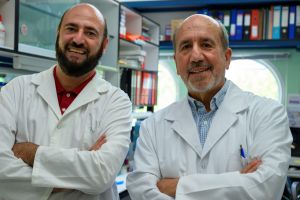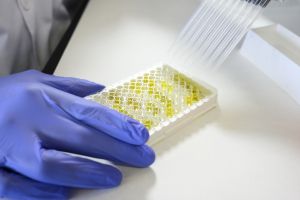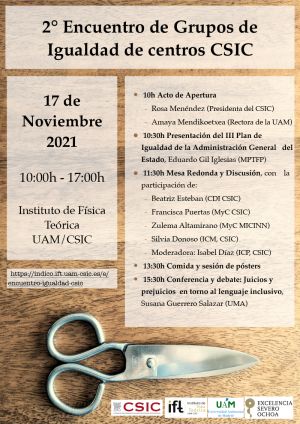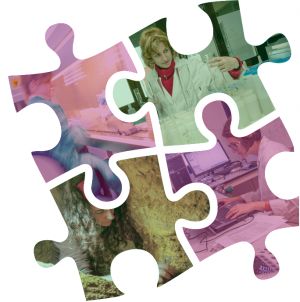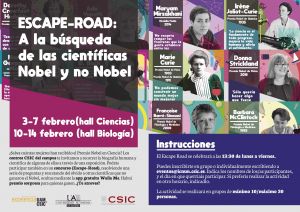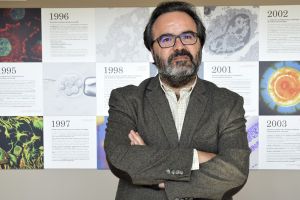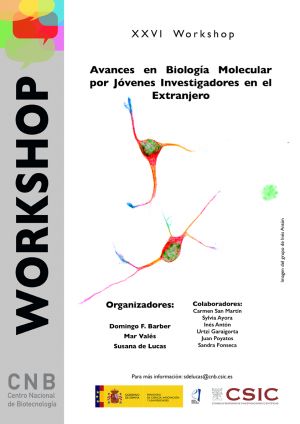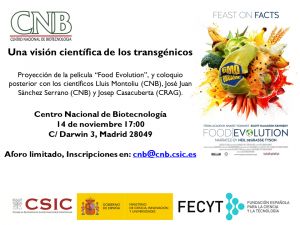- Un acuerdo con la organización de salud pública Medicines Patent Pool (MPP), respaldado por las Naciones Unidas y supervisado por la OMS, facilitará que esta tecnología llegue a los países de bajos recursos
- El CSIC no cobrará regalías por la explotación de su vacuna siempre que se fabrique para países incluidos en la lista de países con ingresos bajos o medios
- Tras los test serológicos, es la segunda vez que el CSIC pone una tecnología a disposición de la iniciativa C-TAP de la OMS para compartirla y producirla a precio asequible
El Consejo Superior de Investigaciones Científicas (CSIC), organismo dependiente del Ministerio de Ciencia e Innovación, pone a disposición de los países en vías de desarrollo su prototipo de vacuna covid-19 basada en el virus vaccinia MVA como vector desarrollada por investigadores del CNB-CSIC. La institución ha firmado un segundo acuerdo con la organización de salud pública Medicines Patent Pool (MPP), respaldada por la Organización de las Naciones Unidas (ONU), y bajo supervisión de la Organización Mundial de la Salud (OMS) que facilitará que esta tecnología avance a ensayos clínicos y llegue a los países más necesitados. Tras los test serológicos de covid-19, es la segunda vez que el CSIC cede una tecnología a través de la iniciativa COVID-19 Technology Access Pool (C-TAP) de la OMS para facilitar al acceso igualitario a tecnologías sanitarias de covid-19.
La firma se enmarca en la iniciativa (C-TAP), creada por la OMS en mayo de 2020 para facilitar el acceso oportuno, igualitario y asequible a productos sanitarios de la covid-19 a través del impulso a su producción. C-TAP proporciona una ventana única mundial a las entidades que desarrollan tecnologías para hacer frente a la covid-19, como terapias, vacunas y sistemas de diagnóstico, con el objetivo de que compartan su propiedad intelectual (patentes), conocimiento y datos, con fabricantes de probada calidad mediante licencias transparentes, no-exclusivas y con voluntad de servir a la sanidad pública.
- Un acuerdo con la organización de salud pública Medicines Patent Pool (MPP), respaldado por las Naciones Unidas, y supervisado por la Organización Mundial de la Salud (OMS) facilitará que esta tecnología llegue a los países en desarrollo
- El CSIC no cobrará regalías por la explotación de su tecnología siempre que se fabrique para países incluidos en la lista de países con ingresos bajos o medios
- Es la primera vez que un centro público de investigación pone una tecnología a disposición de la iniciativa C-TAP de la ONU para compartirla y producirla a precio asequible
El Consejo Superior de Investigaciones Científicas (CSIC) pone a disposición de los países en vías de desarrollo sus test serológicos de anticuerpos para la covid-19. La institución ha firmado un acuerdo novedoso con la organización de salud pública Medicines Patent Pool (MPP), respaldada por la ONU, y bajo supervisión de la Organización Mundial de la Salud (OMS) que facilitará que esta tecnología llegue a los países más necesitados. Es la primera ver que un centro público de investigación cede una tecnología a través de la iniciativa C-TAP de la OMS para facilitar al acceso igualitario a tecnologías sanitarias de covid-19.
El miércoles 17 de Noviembre se celebrará el 2º Encuentro de Grupos de Igualdad del CSIC, que tendrá lugar en el Instituto de Física Teórica (IFT-CSIC), en coordinación con la Comisión Delegada de Igualdad y la Comisión Mujeres y Ciencia del CSIC. Este encuentro se enmarca dentro de las actividades dirigidas a potenciar la Red de Grupos de Igualdad del CSIC, creada a raíz de la celebración del primer encuentro organizado por el Instituto de Ciencias del Mar (ICM-CSIC) el año pasado. El objetivo principal de estos encuentros es fomentar vínculos entre los Grupos de Igualdad del CSIC y favorecer el intercambio de recomendaciones y buenas prácticas en torno a los Planes de Acción en Igualdad de Género de los distintos centros.
Elaborado por la Comisión de Mujeres y Ciencia del CSIC se ha publicado el Informe de Mujeres Investigadoras 2021. Destaca la participación de las mujeres en el Equipo Directivo del CSIC, así como la disminución del porcentaje de Tesis Doctorales defendidas por mujeres, y el estancamiento del índice del techo de cristal.
Se ha publicado la nueva convocatoria para solicitar becas JAE de Introducción a la Investigación en centros del CSIC. Las 250 becas ofertadas becas están orientadas a estudiantes universitarios, especialmente aquellos en el último curso de grado universitario y tendrán una duración de 5 meses consecutivos, iniciándose en octubre de 2021.
El plazo de presentación de solicitudes a través de la web del CSIC es del 10-3-2021 al 09-04-2021
NUEVO: RESOLUCION DE CONCESIÓN: 19 julio 2021
Plazo de aceptación o renuncia: Del 21 de julio al 3 de agosto de 2021
El Centro Nacional de Biotecnología recibirá hasta 29 estudiantes en el curso 2021-2022
Nueva convocatoria para solicitar becas JAE de Introducción a la Investigación en centros del CSIC. Las 250 becas ofertadas becas están orientadas a estudiantes universitarios, especialmente aquellos en el último curso de grado universitario y tendrán una duración de 5 meses consecutivos, iniciándose en septiembre u octubre de 2020.
El plazo de presentación de solicitudes se ha vuelto a abrir y termina el 10 de junio (incluido)
El Centro Nacional de Biotecnología recibirá 11 estudiantes en el curso 2020-2021
16 de JULIO 2020: RESOLUCION DEFINITIVA publicada en la página del CSIC
Descubre en el campus de Cantoblanco a científicas premiadas y olvidadas por el Nobel
Entre el 3 y el 14 de febrero se realizará un escape road en las facultades de ciencias y biología donde se presentarán perfiles de mujeres galardonadas con el Nobel en un recorrido en el que los visitantes responderán preguntas sobre las investigadoras.
- Los participantes buscarán, a través de una aplicación móvil, carteles ocultos de grandes científicas que no ganaron el Nobel.
- Este “escape road” es una actividad conjunta organizada por los centros del CSIC del campus de Cantoblanco: (Instituto de Ciencia de Materiales de Madrid, Instituto de Cerámica y Vidrio, Instituto de Catálisis y Petroquímica, Centro Nacional de Biotecnología, Centro de Biología Molecular, Instituto de Ciencias Matemáticas, Instituto de Física Teórica e Instituto de Investigación en Ciencias de la Alimentación.)
En el CNB nos sumamos a la celebración de la Semana de la Ciencia 2018 el día 14 de noviembre a partir de las 5 de la tarde. Trás la proyección de la película documental Food evolution, se realizará un coloquio posterior con los científicos Lluís Montoliu y José Juan Sánchez Serrano, del Centro Nacional Biotecnología (CNB) Madrid y Josep Casacuberta, del Centre for Research in Agricultural Genomics (CRAG), Cerdanyola.
Food evolution es un documental dirigido por Scott Hamilton Kennedy y narrado (en inglés) por Neil de Grass Tyson. La película, con subtítulos en castellano, muestra la controversia que rodea al uso de organismos modificados genéticamente como alimentos, abordando el debate surgido entre científicos y consumidores sobre cómo alimentar a nuestra población en expansión de manera segura y sostenible.
Dirección: Centro Nacional Biotecnología, C/Darwin 3 (Campus Cantoblanco), Madrid 28049.
Fecha 14 de noviembre, 17:00, salón de actos
Aforo: 50 personas
COOKIES POLICY
A cookie is a text file that is stored on your computer or mobile device via a web server and only that server will be able to retrieve or read the contents of the cookie and allow the Web site remember browser preferences and navigate efficiently. Cookies make the interaction between the user and the website faster and easier.
General information
This Website uses cookies. Cookies are small text files generated by the web pages you visit, which contain the session data that can be useful later in the website. In this way this Web remembers information about your visit, which can facilitate your next visit and make the website more useful.
How do cookies?
Cookies can only store text, usually always anonymous and encrypted. No personal information is ever stored in a cookie, or can be associated with identified or identifiable person.
The data allow this website to keep your information between the pages, and also to discuss how to interact with the website. Cookies are safe because they can only store information that is put there by the browser, which is information the user entered in the browser or included in the page request. You can not run the code and can not be used to access your computer. If a website encrypts cookie data, only the website can read the information.
What types of cookies used?
The cookies used by this website can be distinguished by the following criteria:
1. Types of cookies as the entity that manages:
Depending on who the entity operating the computer or domain where cookies are sent and treat the data obtained, we can distinguish:
- Own cookies: are those that are sent to the user's terminal equipment from a computer or domain managed by the editor itself and from which provides the service requested by the user.
- Third party cookies: these are those that are sent to the user's terminal equipment from a machine or domain that is not managed by the publisher, but by another entity data is obtained through cookies.
In the event that the cookies are installed from a computer or domain managed by the editor itself but the information collected by these is managed by a third party can not be considered as party cookies.
2. Types of cookies as the length of time that remain active:
Depending on the length of time that remain active in the terminal equipment can be distinguished:
- Session cookies: cookies are a type designed to collect and store data while the user accesses a web page. Are usually used to store information that only worth preserving for the service requested by the user at any one time (eg a list of products purchased).
- Persistent cookies: cookies are a type of data which are stored in the terminal and can be accessed and treated for a period defined by the head of the cookie, and can range from a few minutes to several years.
3. Cookies types according to their purpose:
Depending on the purpose for which the data are processed through cookies, we can distinguish between:
- Technical cookies: these are those that allow the user to navigate through a web page or application platform and the use of different options or services it exist as, for example, control traffic and data communication, identify the session, access to restricted access parts, remember the elements of an order, make the buying process an order, make an application for registration or participation in an event, use security features while browsing store content for dissemination videos or sound or share content via social networks.
- Customization cookies: these are those that allow the user to access the service with some general characteristics based on a predefined set of criteria in the user terminal would eg language, the type of browser through which you access the service, the locale from which you access the service, etc.
- Analysis cookies: they are those that allow the responsible for them, monitoring and analyzing the behavior of users of the web sites that are linked. The information gathered through such cookies are used in measuring the activity of web sites, application or platform and for the profiling of user navigation of such sites, applications and platforms, in order to make improvements function data analysis how users use the service.
Management tool cookies
This Website uses Google Analytics.
Google Analytics is a free tool from Google that primarily allows website owners know how users interact with your website. Also, enable cookies in the domain of the site in which you are and uses a set of cookies called "__utma" and "__utmz" to collect information anonymously and reporting of website trends without identifying individual users..
For statistics of use of this website use cookies in order to know the level of recurrence of our visitors and more interesting content. This way we can concentrate our efforts on improving the most visited areas and make the user more easily find what they are looking for. On this site you can use the information from your visit for statistical evaluations and calculations anonymous data and to ensure the continuity of service or to make improvements to their websites. For more details, see the link below privacy policy [http://www.google.com/intl/en/policies/privacy/]
How to manage cookies on your computer: disabling and deleting cookies
All Internet browsers allow you to limit the behavior of a cookie or disable cookies within settings or browser settings. The steps for doing so are different for each browser, you can find instructions in the help menu of your browser.
If you decline the use of cookies, since it is possible thanks to the preferences menu of your browser or settings, reject, this website will continue to function properly without the use of the same.
Can you allow, block or delete cookies installed on your computer by setting your browser options installed on your computer:
- For more information about Internet Explorer click here.
- For more information on Chrome click here.
- For more information about Safari click here.
- For more information about Firefox click here.
Through your browser, you can also view the cookies that are on your computer, and delete them as you see fit. Cookies are text files, you can open and read the contents. The data within them is almost always encrypted with a numeric key corresponding to an Internet session so often has no meaning beyond the website who wrote it.
Informed consent
The use of this website on the other hand, implies that you paid your specific consent to the use of cookies, on the terms and conditions provided in this Cookies Policy, without prejudice to the measures of deactivation and removal of cookies that you can take, and mentioned in the previous section.

